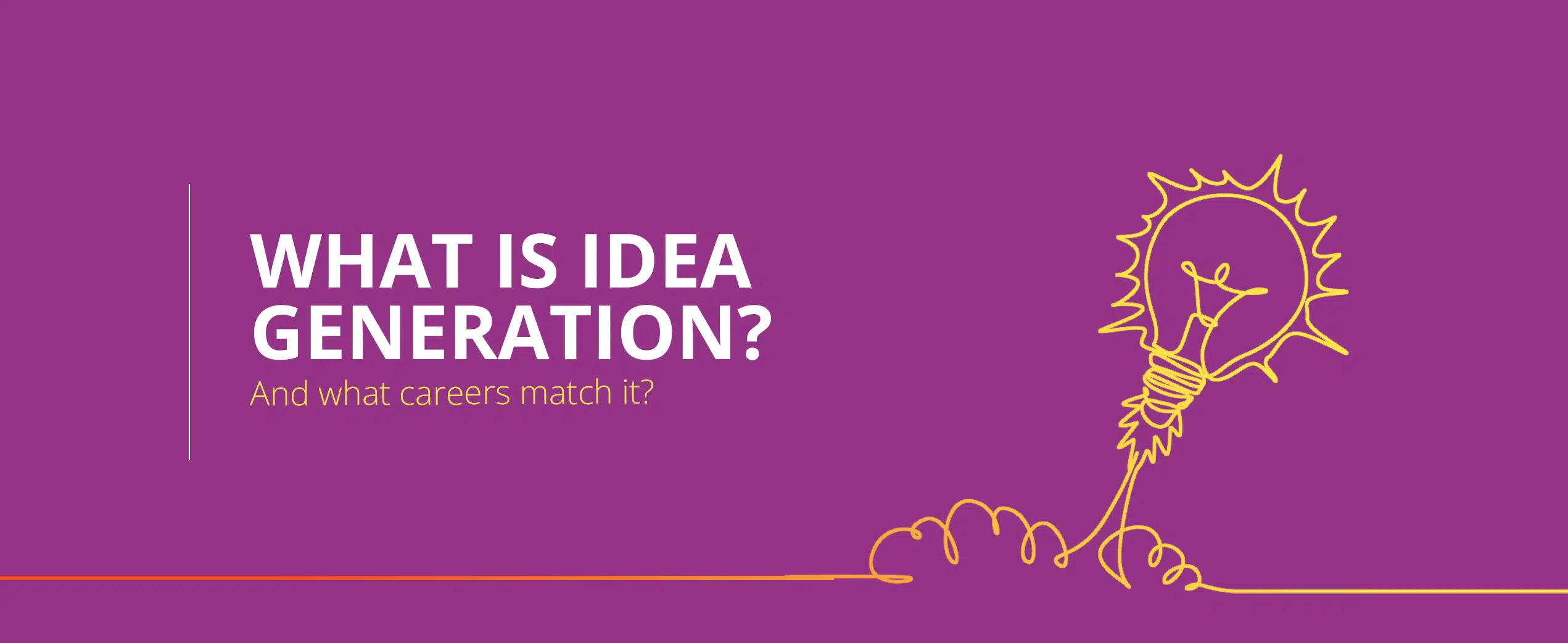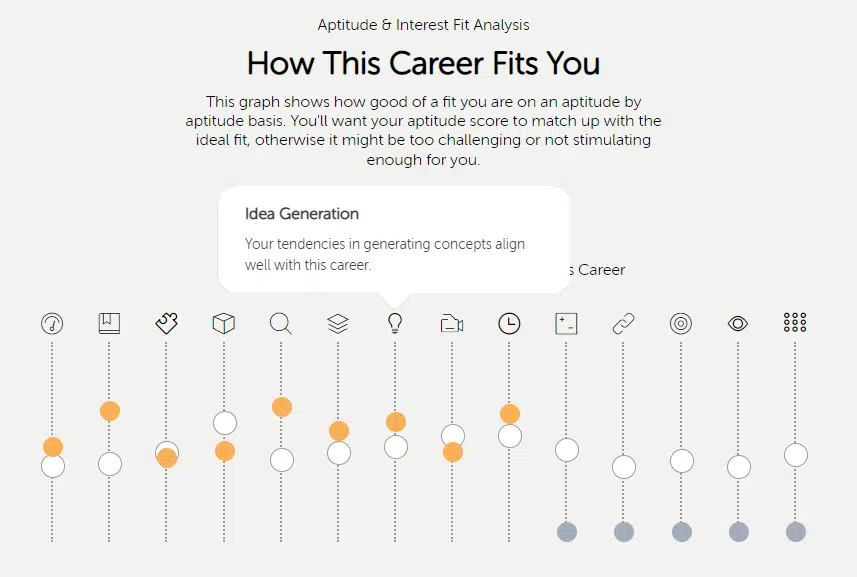Idea generation, or ideation, is the act of coming up with ideas. It’s more than a process though. It’s also an aptitude, which is a natural ability to do or learn something.
Keep scrolling to learn more about the process of idea generation, idea generation as an aptitude, and the career pathways individuals with idea generation are ideally suited for.
The process of idea generation
The process of generating ideas can be simple or complex. When you sit down and think about how to solve a problem, you use the process of idea generation. You might simply think, you might make notes, or sketch ideas.
Ideas can be generated by groups as well, where multiple people brainstorm ideas to solve a problem. The process can be verbal, written, or a combination of the two. The problem to be solved can be simple or complex as well — from where to get lunch to how to cure cancer.
There are formal methods to help generate ideas. Mind mapping, the SCAMPER technique, and brainstorming sessions are all examples of ideation techniques. These and other idea generation techniques, help with creative problem solving.
No matter what method you use, idea generation is a valuable part of life and business. Marketing needs new ideas to rebuild the brand, finance should think outside the box to effectively manage expenses, and the executive team wants new thoughts on how to grow revenue and/or increase team morale.
Idea generation as an aptitude
An aptitude is a natural talent for doing something. For example, being good at math comes naturally for some people. For others, it’s a difficult task. Aptitudes can be for physical abilities, mental abilities, intellectual abilities, judgment, and more.
The ability to generate ideas, idea generation, is a type of aptitude that falls into what is known as performance-based aptitudes — natural abilities to do or learn a specific type of task. Having an aptitude for math means someone has an aptitude for numerical reasoning or the ability to logically process complex math problems.
High vs low aptitude for ideation
As with numerical reasoning (or math), some people have a natural aptitude for idea generation. The aptitude for idea generation indicates someone has many ideas or words that come quickly and at a high volume compared to a few ideas follow that come a few or one at a time.
If you come up with ideas quickly and easily, you likely have a higher aptitude for idea generation. You’re someone who thinks on your feet, responds quickly, and enjoys a brainstorming session.
On the other hand, if you tend to mull over one idea at a time, you may have a lower natural talent for idea generation.
However, having a lower aptitude for idea generation isn’t bad. It simply means your natural abilities are better in other areas.
There are places for all aptitudes in the world and in careers.
How do you know if you’re good at idea generation?
You can find out if you’re good at idea generation using an aptitude assessment or test that uncovers your aptitudes. A few examples include:
- Critical thinking tests, such as the Watson Glaser critical thinking test, assess someone’s ability to think critically.
- Verbal ability tests assess the ability to understand written language.
- Visual reasoning assessments uncover the natural ability to visualize information to solve a problem.
- Numerical reasoning tests reveal natural math abilities.
Many assessments assess multiple aptitudes at a time. An example is the YouScience Discovery aptitude-based career guidance assessment, used by secondary schools throughout the US to assess the aptitudes and interests of secondary students for careers. Discovery uses nine brain-game-like exercises to uncover aptitudes for idea generation, visual comparison speed, spatial visualization, numerical reasoning, and more.
How do I prepare for an aptitude assessment?
An aptitude assessment isn’t used like a traditional test where you pass or fail. Instead, it simply measures your natural inclination to perform in specific areas based on your innate characteristics.
It’s been shown that aptitudes solidify by the age of 14. Taking one before that age won’t guarantee your results will match if you take it later. But, regardless of when you take it, you don’t need to prepare for an aptitude assessment or take any practice tests. Instead, use it as an opportunity to uncover your natural talents without any external factors or preparation affecting the results.
How YouScience Discovery assesses the aptitude for generating ideas
YouScience Discovery is part of the YouScience platform. It uses a brain game to assess idea generation. To determine your aptitude for idea generation, it measures the quantity, not the quality of ideas that enter your mind at a time. It also assesses multiple other aptitudes.
Discovery shows three areas of idea generation ability. There is no high score or low score, simply different natural approaches to generating ideas. In fact, when the three types come together, it can create an ideal team.
Brainstormer
Brainstormers have a strong aptitude for generating a lot of ideas. The flip side of all of those ideas is that brainstormers can struggle to stay focused.
Idea contributor
Idea contributors excel at elaborating when a situation calls for it, especially if they’re knowledgeable or passionate about the subject. They aren’t naturally inclined to have the flood of ideas a brainstormer has but are strong at talking about the next steps and putting ideas into action.
Concentrated focuser
Concentrated focusers get excited about other people’s ideas and are good at promoting those ideas. They also excel at implementing and sharing others’ ideas.
Careers pathways for idea generators
When you have a higher aptitude for idea generation — for example, you’re a brainstormer — you’re potentially a good fit for a career as a researcher, designer, strategic planner, inventor, chief executive, or a marketing or sales professional. See the chart below for a few careers where brainstormers might excel.
Career Pathway |
Starting salary |
Average salary |
Education investment |
| Intelligence analyst | $41,000 | $80,000 | None |
| Advertising sales agent | $23,000 | $62,000 | None |
| Web developer | $35,000 | $71,000 | 2+ years |
| Architectural drafter | $33,000 | $53,000 | 2+ years |
| Architect | $46,000 | $83,000 | 4+ years |
| Chief executive | $63,000 | $134,000 | 4+ years |
| Marketing manager | $66,000 | $141,000 | 4+ years |
| Poet, lyricists, or creative writer | $29,000 | $69,000 | 4+ years |
| Editor | $29,000 | $65,000 | 4+ years |
| Physicist | $56,000 | $119,000 | 7+ years |
| Biochemist or biophysicist | $45,000 | $93,000 | 7+ years |
Data from the YouScience Discovery, which is provided by O*NET Online, BLS (Bureau of Labor Statistics, U.S. Department of Labor, Occupational Handbook), and NCES (U.S. Department of Education. Institute of Education Sciences, National Center for Education Statistics).
If you fall into the concentrated focuser or idea contributor category, there are great careers for you too. You can find what your aptitude for idea generation is and your best-fit careers when you take the YouScience Discovery aptitude assessment.
Discover your aptitude for ideation
Your Discovery results show you your aptitudes and how each of them aligns with specific careers. It’s available as part of the YouScience Platform with licenses available for districts, schools, and organizations, and for individuals.



